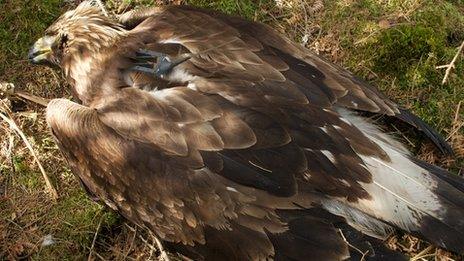Golden eagle 'died after being caught in illegal trap'
- Published

The golden eagle was found under a tree near a country road
A golden eagle suffered a "lingering death" after its legs were broken by a trap, RSPB Scotland has said.
The bird had been fitted with a satellite transmitter which showed it had not moved for several days.
Its body was found, lying face down with its wings folded, under a tree and close to a lay-by on a quiet country road near Aboyne on Deeside.
RSPB Scotland has offered a £1,000 reward for information that leads to a successful prosecution in the case.
However, the Scottish Gamekeepers Association said it would be carrying out its own inquiry because it believed there were "irregularities" in the case.
The bird was found on 5 May, before being taken for a post-mortem examination at the Scottish Agricultural College laboratory in Aberdeen.
This concluded that the bird had suffered two broken legs due to trauma "that could be consistent with an injury caused by a spring type trap" and that the severity of these injuries "would prevent the bird from being able to take off".
The bird had been fitted with a transmitter by RSPB Scotland staff, in full partnership with a local landowner, a few days before it had fledged from a nest in the Monadhliath Mountains, south-east of Inverness, in July 2011.
By re-examining the satellite data, RSPB Scotland staff discovered the young bird spent its first few months in that area before venturing further afield.
By April 2012 it was frequenting an area of upper Deeside, before moving south-west into Glenshee.
On 28 April, the bird moved eastwards into Angus. The following day, at 06:00, it was located on a hillside overlooking Glen Esk.
Over the next 15 hours, a succession of satellite tag readings, accurate to within less than 20 metres, showed that the bird did not move from this precise spot until at least 21:00 that evening, after nightfall.
However, by 04:00 the next morning, it appeared to have travelled, during the hours of darkness, some 10 miles north, to the location where its body was discovered five days later.
Satellite readings revealed that while the bird did not move from this position, it was probably alive until 4 May.
Follow-up enquires by both Tayside and Grampian Police found no further evidence about how the eagle sustained its injuries.
'Lingering death'
It could also not be established how the eagle came to move from Glen Esk to a position under a tree branch on Deeside overnight.
However, a number of eagle down-feathers were found between the lay-by and the bird's final resting place.
Ian Thomson, RSPB Scotland's head of investigations, commented: "It is disgraceful that this magnificent bird was subjected to such suffering. The post-mortem evidence suggests that this bird was caught in an illegally-set trap, smashing both legs.
"The data obtained from the satellite transmitter indicated that the eagle did not move from one spot, on a hill high above Glen Esk, for over 15 hours.
"Then, during the night, when eagles do not readily fly, it has inexplicably moved to a new position, hidden under a tree and close to a road. Here, over the next four days, this eagle suffered a lingering death."
Stuart Housden, RSPB Scotland director, added: "Anyone who cares about our wildlife will be disgusted by what appears to be an appalling crime and the lengths taken to hide the facts from discovery.
"Whilst efforts to stamp out the illegal poisoning of birds of prey are perhaps beginning to yield results, this dreadful case shows that the persecution of our raptors continues through the use of traps and other means.
"We call upon anyone who can provide further information about this case to contact the wildlife crime officer at either Tayside or Grampian Police without delay.
"Cases like this really do have a negative impact on Scotland's reputation as a country that respects and values all its wildlife heritage. I am today offering a £1,000 reward for information that will assist a successful prosecution."
A spokesman for the Scottish Gamekeepers Association said there were "a number of irregularities" in the case.
Legal traps
He said: "After looking at what the scientists have inferred may have happened, and also studying the interpretations thereafter, the SGA has decided to open its own inquiry and will conclude this before commenting on a case it believes is far from clear cut.
"As an organisation we will be happy to present our findings to the police in order to assist the investigation."
It said its members received information and guidance on how to set and operate legal traps.
"As an organisation we have been extremely pleased at the dramatic fall in bird of prey abuse cases in Scotland, with only two confirmed cases in 2012, and will continue to work towards there being none," he added.
A satellite-tagged golden eagle, named Alma by researchers, was found to have been illegally poisoned in Glen Esk in 2009, while other poisoned eagles fitted with transmitters were found in Grampian in 2011, and in Lochaber earlier this year.
- Published21 September 2012
- Published7 September 2012
- Published27 June 2012
- Published8 June 2012